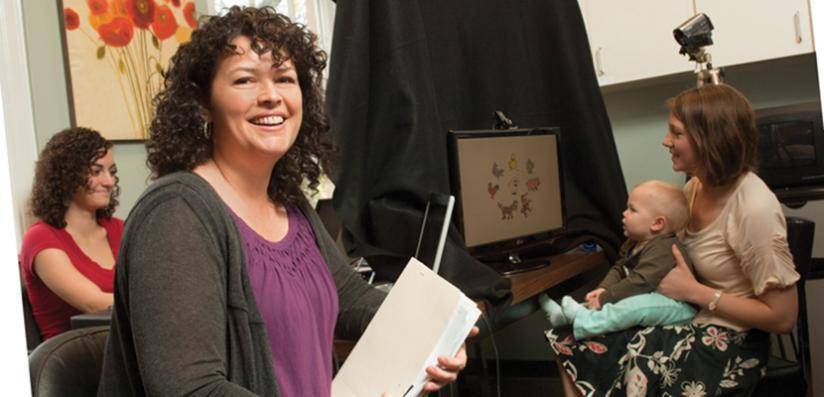Given the Autism Spectrum Disorder affects 1 in 68 children, studies that target the early identification and developmental needs of these children are critical.
In 2011, Dr. Roberts was the recipient of a five year NIH R01 grant entitled “Emergence and Stability of Autism in Fragile X Syndrome.” In this study, Dr. Roberts and her team analyzed the behavior of infants who were at high risk for developing autism. The two groups she focused on were infants with an older sibling diagnosed with Autism because approximately 20% of these infants will end up diagnosed with autism during the preschool years. Fragile X disorders represent a genetic disorder that is also at high risk for Autism with 50 – 75% of these infants later diagnosed with Autism. Given that Autism affects so many individuals and has a high impairment for these individuals and their families, this work was geared towards an increased understanding of the early features of Autism to promote earlier diagnosis and treatment. This was groundbreaking research, for although fragile X is the leading genetic cause of autism, this was the first longitudinal study to analyze the early indicators of autism in this population.
One of the recently funded studies is a preschool follow-up of these infants to track their development over time. With this new 3.1 million dollar award from NIH, Dr. Roberts will be able to follow the development of the infants from 9 months-of-age to 5 years-of-age and identify which features during infancy were predictive of anxiety diagnoses or other developmental delays in these infants at high risk for developmental impairments. This information will then be translated to efforts targeting early identification and treatment.
Given that anxiety disorders are one of the most prevalent and impairing mental health disorder in young children, Dr. Roberts has been awarded a 3.1 million dollar grant to examine the early features of anxiety in children with Autism and Fragile X Syndrome. Between 70-80% of young children with Autism or Fragile X Syndrome are diagnosed with an anxiety disorder and this reduces the quality of life and overall productivity of these individuals. Thus, knowing early signs of an anxiety disorder in this samples could help to offset its effect by implanting treatment programs designed to reduce the impact of anxiety on young children with neurodevelopmental disorders.
In addition to these research efforts, Dr. Roberts is involved in several USC and statewide efforts to increase knowledge of Autism. She works with a cadre of undergraduate and graduate students who are involved in research projects related to Autism. Also, Dr. Roberts and her team are involved in speaking to the community about this work with talks scheduled at the SC Autism Conference this fall and speaking engagements at conferences and at the MIND Institute at UC Davis, California in the spring.
Dr. Roberts, a member of the Research Consortium on Children and Families and the Institute for Mind and Brain at USC, has worked with Dr. Twiss from Biology to establish a statewide autism and neurodevelopmental disabilities network for research enhancement. This consortium, the South Carolina Autism and Neurodevelopmental Disabilities (SCAND) has partnered with researchers from the Medical University of South Carolina, Greenwood Genetics as well as the Greenville Health System, among others. The goal for this consortium is to serve as an organizing foundation for Autism research efforts across the state of South Carolina.
To learn more information refer to the Neurodevelopmental Disorders Lab.
